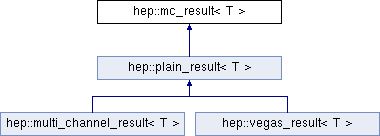Detailed Description
template<typename T>
class hep::mc_result< T >
The estimation of a Monte Carlo integration. Every Monte Carlo integrator returns one or more instances of this class. The PLAIN Monte Carlo integrator, for example, calculates the parameters as follows:
\begin{align} E &= \frac{1}{N} \sum_{i=1}^N f ( \vec{x}_i ) \\ S^2 &= \frac{1}{N-1} \left[ \frac{1}{N} \sum_{i=1}^N f^2 ( \vec{x}_i ) - E^2 \right] \end{align}

Public Types | |
| using | numeric_type = T |
Public Member Functions | |
| mc_result (std::size_t calls, std::size_t non_zero_calls, std::size_t finite_calls, T sum, T sum_of_squares) | |
| mc_result (std::istream &in) | |
| mc_result (mc_result< T > const &)=default | |
| mc_result (mc_result< T > &&) noexcept=default | |
| mc_result & | operator= (mc_result< T > const &)=default |
| mc_result & | operator= (mc_result< T > &&) noexcept=default |
| virtual | ~mc_result ()=default |
| std::size_t | calls () const |
| T | value () const |
| T | variance () const |
| T | error () const |
| std::size_t | finite_calls () const |
| std::size_t | non_zero_calls () const |
| T | sum () const |
| T | sum_of_squares () const |
| virtual void | serialize (std::ostream &out) const |
Member Typedef Documentation
◆ numeric_type
| using hep::mc_result< T >::numeric_type = T |
The numeric type used for member variables.
Constructor & Destructor Documentation
◆ mc_result() [1/4]
|
inline |
Constructor.
◆ mc_result() [2/4]
|
inlineexplicit |
Deserialization constructor.
◆ mc_result() [3/4]
|
default |
Copy constructor.
◆ mc_result() [4/4]
|
defaultnoexcept |
Move constructor.
◆ ~mc_result()
|
virtualdefault |
Destructor.
Member Function Documentation
◆ calls()
|
inline |
The number of function evaluations \( N \) performed to obtain this result.
◆ error()
|
inline |
Standard deviation \( S \) of the expectation value.
◆ finite_calls()
|
inline |
Returns the number integrand evaluations that were finite.
◆ non_zero_calls()
|
inline |
Returns the number of integrand evaluations that were not zero. This includes the both finite and non-finite numbers.
◆ operator=() [1/2]
|
default |
Assignment operator.
◆ operator=() [2/2]
|
defaultnoexcept |
Move assignment operator.
◆ serialize()
|
inlinevirtual |
Serializes this object.
Reimplemented in hep::multi_channel_result< T >, hep::vegas_result< T >, and hep::plain_result< T >.
◆ sum()
|
inline |
Returns the sum, i.e. \( \sum_{i=1}^N f ( \vec{x}_i ) \).
◆ sum_of_squares()
|
inline |
Returns the sum of squares, i.e. \( \sum_{i=1}^N f^2 ( \vec{x}_i ) \).
◆ value()
|
inline |
Expectation value \( E \) of this result.
◆ variance()
|
inline |
Variance \( S^2 \) of the expectation value.